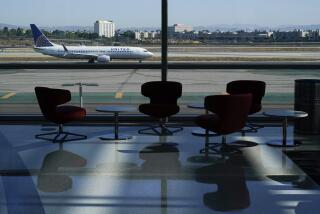Delta to Cut New Aircraft Spending Until 2002 : Transportation: The carrier, following similar moves by other major airlines, plans to slash $5 billion from its budget.
- Share via
Badly shaken after two years that have ravaged the airline industry, Delta Air Lines on Wednesday joined the nation’s other major carriers by saying it will slash spending on new aircraft and equipment by $5 billion through 2001.
The $20 billion in combined spending cuts announced by Delta, American and United during the past five months reflect in part the painful realization that domestic air travel will grow more slowly than anticipated in the years ahead.
Expectations have been lowered primarily as a result of the pain inflicted by the Gulf War and recession, which forced several weaker carriers--such as Pan Am and Eastern--out of business, threw thousands out of work and led to $6 billion in losses.
In addition, the consolidation of the industry could lead to higher fares, which would limit future growth.
“To bounce back from the loss in traffic would take a big surge, and we just don’t see that happening,” said Gene Mercer, a forecasting official at the Federal Aviation Adminstration, which reduced its expectations about how fast domestic passenger traffic will grow during the decade.
In its announcement Wednesday, Atlanta-based Delta said it will buy 100 fewer planes than expected through 2001. As part of that effort, the nation’s third-largest carrier said it will not take advantage of options to buy 10 planes from McDonnell Douglas and another two from Boeing. Those options expire May 1.
Delta also plans to cut the ranks of its approximately 79,000 workers, primarily through attrition, and will consolidate certain operations to reduce costs.
“The aircraft capital spending reductions announced today are designed to permit Delta to maintain a steady growth program through fiscal year 2001 without a significant change in capacity growth,” said Chairman and Chief Executive Ronald W. Allen in a statement.
In composite trading Wednesday on the New York Stock Exchange, Delta shares closed up 37.5 cents at $59.75. Meanwhile, Boeing stock fell 50 cents to $43.875, and McDonnell Douglas shares fell $2 to $57.50.
Last week, Delta reported a larger than expected $151.6-million loss for the first three months of 1992. Delta blamed the loss on continued weakness in air travel and the costs associated with absorbing the Pan Am routes it purchased from the failed carrier last year.
In addition to Delta’s planned spending cuts for aircraft and other equipment, American will reduce spending by $8 billion during the next several years, and United plans a $6.7-billion decrease.
Along with expectations of slower growth, the financial pain suffered by the industry has made the airlines more leery of taking on billions of dollars in obligations, said Dan Kasper, director of the transportation practice at Harbridge House, a Boston-based consulting firm.
“Given the recession and the war’s affect on the traffic and profits, the carriers are looking much more carefully at their ability to finance these kinds of purchases,” Kasper said.
The smaller budget for new aircraft might actually be more realistic than the aggressive spending plans of the past. In the years before the recession, when air travel was booming, airlines rushed to order aircraft for fear of being left out in the cold, said Harold Sirkin, transportation specialist at the Boston Consulting Group.
Now, faced with slower growth and abundance of existing planes available for lease, Sirkin said airline planners are more likely to think: “My projections are lower, there are all these planes available to lease, so why spend all this money” on new aircraft?
More to Read
Inside the business of entertainment
The Wide Shot brings you news, analysis and insights on everything from streaming wars to production — and what it all means for the future.
You may occasionally receive promotional content from the Los Angeles Times.










